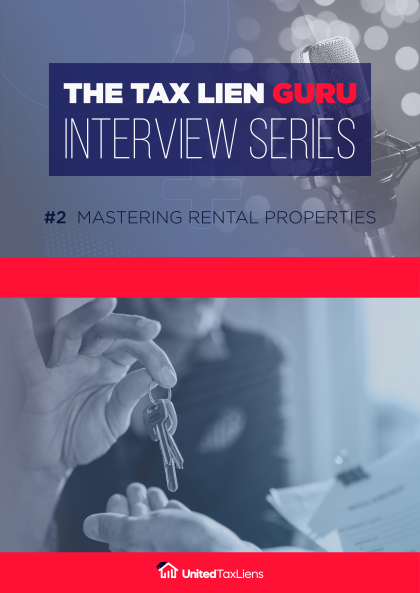
Eric as we start to look at investing in real estate, rental properties—tell me about the investment opportunities associated with rental properties.
I have to tell you I really love rental properties, and for so many reasons. If you're in that realm where you're like: I don't know about rental properties. I'm only making a couple of hundred dollars, or $500 a month. If you don't understand or don't think there's value in owning rental properties—after our discussion hopefully, it will allow you to reflect on your mindset and look at what's possible. Because rental income will enable you to build long-term wealth and passive generational income, you can pass on to others.
If you purchase a rental property, whether it's a commercial property or a single-family or multifamily—whatever it is. Imagine someone paying for that asset for you. They're paying it down over time, they're making the payments on it, and you get benefits by owning it. Now rental property, you have to dig into the nuts and bolts of what it is.
Can you give us an example of some of your personal experience with rental property investing?
Sure! This was the very first property that I've purchased. It was a rental property. I was in a place where I had no money, and I had marginal credit at best when I first started—this was in 1994. So this is a long time back. And what happened was: I was like how could I figure this out, how could I make this happen? And so I went to the bank. The bank qualified me and said “we will give you a 60% loan,” and then I was in a place to where I had to figure out, well, how do I come up with the other 40%?
So I said: I can save it up, I can go get a partner, maybe I can talk to the seller and see if the seller might be the bank. And in this instance, the seller did. So what I did is I got a bank loan for 60%, I got the seller to finance 40% so the whole purchase was financed, and I walked into it with a $187 cash flow. Imagine that, no money into it and $187 a month cash flow. That's called an infinite return. And what happens is, every single month, that rent comes in and keeps paying down that property. Now I don't have this property anymore, but I will tell you it was a great foundational start for me because it showed me the benefits of rental properties. It's not just the cash flow, and there are so many other things that come from rental properties. And let's talk about it for a second.
So what did you end up doing to solve this problem?
The first thing you have to be able to be really good at with properties that takes all of the fear away, is you have to be good at running the numbers. So you gotta be able to say you take the income, so if the rent is $1500 and you want to look at all your expenses. What is the management fee?
Now here's the thing, you're not going to want to manage your own properties. You want someone else to do it for you. It's OK if it's like your first or second one, and you're just learning how to do it, but after that, you're going to want to maximize your time to build your real estate portfolio. And so having that person on your team will help out.
So you look at the income that's coming in, and then you look at your expenses. You do take a vacancy allowance out of it. You do take the rent payment, the mortgage, the insurance, the taxes, all of those things. At the end of the day, you're leftover with a positive cash flow. Now one of the best things that you want to do, if you're ending up with a negative cash flow, and you're like, oh, I'd lose money if I buy this, now the actual definition of an asset is something that puts money into your pocket. The definition of bad debt, is something that takes money out of your pocket. So when you get into a deal, especially a rental deal, you want to make sure that the property puts money in your pocket on an ongoing basis.
Otherwise, you're in a position where you're losing money and you're feeding that property. You don't want to be in that position. If you do find when you run the numbers, you're in a negative cash flow situation, change it. Either get a better interest rate, or offer a lower price, or find a way to make it work. And I'll tell you guys; the most creative amongst us in real estate investing are those that will be the most successful. So if you hit a dead-end, don't stop. Just figure out a way to make it work, so it works for you as you move forward with that process.
What are some other positive benefits to owning rental properties in real estate investing?
Just think of this. So if you own a rental property for 10 years, right, and you're paying down that mortgage. Whether you have a 20 year mortgage, 30 year mortgage, whatever it is. Well, you have a tenant that's paying down that loan balance every single month. And so it's actually taking that loan balance down. That's another great benefit for you. And what happens historically? Suppose you look at the historical numbers when it comes to property values, and you look at appreciation over time you're gonna be in that place to where it's like guess what. In that case, properties go up anywhere between 3-6% annually and that's pretty awesome.
Now we don't want to count on that necessarily, that's just another benefit of having a property. Because it goes up in value, we pay it down. And there's another unique feature about rental properties. And if you don't understand it, invest a little bit of time figuring it out. It's called depreciation. And there are different forms of depreciation. Now, what happens when you purchase a rental property? You have to establish what your cost basis is in the property.
So, how much is it in the land, how much is it in the improvements? And the great thing is we're going to take those improvements—over a 27 ½ year time period, and then that's an allowance that you're going to go ahead and depreciate against the property. It's almost like a loss. Now, this does affect your cost basis in the property. That's why you need a tremendous tax CPA, someone who understands real estate, so that you can maximize these opportunities for yourself. So you have depreciation, you have an appreciation, you have loan paydown, you have cash flow, you have so many options to build wealth.
Can you give us an example to help drive the point home?
Absolutely. Imagine what would happen. Would your life be any different? So let's say you started investing 10 years ago. And you decided to buy one property a year as a rental. And the cash flow builds up. And let us say each property is producing at this time $500, and over time, those mortgages will go down to zero and those rents will keep going up. That's another benefit that I failed to mention.
What do rents do? Rents go up. And if you ever have questions about rents, a great tool that I like to use, it's free it's a really cool tool to use, it's called rentometer.com
You can put in the address, the bedrooms, bathrooms, and it will give you all the rents around in that area which is really great. Then, make sure you're using your other real estate software and those different programs that will maximize your opportunity to understand what's going on in that market. Rental properties, foundational rental wealth really will change your life. Let's talk about some action items you should be taking if you want to understand more about rental properties.
First off, you want to be in a place where you understand how to run the numbers. When it comes to a cash flow statement, income minus expenses. That is the foundational key when you're looking at properties. Now there are other terms out there that are used on rental properties to kind of establish value. You may hear a term called cap rate, cap rate is just a function of the net operating income, divided into the purchase price and it gives you a percentage.
Can you give us a little more detail about what cap rate is?
The higher the cap rate that we get as investors, the better for us. So you want to go out and find the general cap rate for your area. And it's different area by area, and you may find that investing in my local area may be a little tough on the cap rate and cash flow, so you go find an area that's very profitable and go ahead and do your market research. Maybe it's a certain area across the country; perhaps it's a specific area a few miles away from you. Just find those best opportunities for you. Now, this doesn't just apply to single-family homes, it applies to a duplex, a triplex, a four unit. Now when you cross over into the 5 unit, that's where you call it commercial property. You always have to be in a mindset that is: what can I do to improve this property.
So you could build a lot of equity and wealth and increase the value of the property. If you go into a property and raise the rents, if you improve the condition, if you get it better managed, there's lower vacancy. Everyone asks when is the best time to get into buying rental property, and the real answer to that is: today. So you want to go ahead and take the time to understand your situation. Make sure you understand the income, the expense. Make sure you have a team member who can help you with the process to maximize your benefits when it comes to understanding everything and the benefits that come from rental properties. But let's talk about that for a second, what are those benefits again. You have someone paying for your asset.
What about depreciation, how does that relate to cap rate?
You have monthly cash flow. You have benefits like depreciation. There's one other thing I wanted to talk about on depreciation. If you can improve a property, sometimes you can take it all within a year, or you can spread it out over 5 years depending upon what it is. But if you do a repair that's a little bit different, so that's why you're going to need a qualified CPA to help you determine what all those schedules are so you don't have to stay on top of it. But depreciation is an incredible value on owning rental property. So remember you also have an appreciation, we talked about that. What else do we have they paid on the mortgage and over time it puts you in a great place. Make sure you're getting the best interest rates possible. Now remember if initially it looks like it's not going to work, change the numbers until it does work for you. Again, I can't tell you how important rental properties are to your investment strategies as you move forward. So if you haven't considered it before, take the time to do it!
Eric, as I look at a property, a single family home, and I'm thinking wow this might be a rental property! How does that change my look at the rehab and what I'm gonna do to the property.
OK so on rental properties, it's area-specific right? There's retail ready for someone who is going to purchase it to live in it. And then there's a rental ready for someone who will rent it, and pay the rent to you. Now what does your area tell you? If the market says that the rental properties have to be at that prepare level, then you have to make sure they are up to par. But a rental property is typically a little different from a property that you're selling for someone going to move into the property.
And so there's kind of an anticipation that the renter might damage something or there could be flooring issues, so as I select those kinds of treatments in the home, it's about how long will these things last? And if there is something damaged how much do I care.
You will be replacing carpet and paint more frequently, on a rental property than typically a homeowner will be. So just because it typically gets a little more wear and tear, you're not going to go to that high-end finish and have that be at that level. This brings up an excellent point, as part of your due diligence in having the right renter there, you don't want to do that. You want your property manager to qualify those individuals. You want your property manager to do those background checks and make sure they do all those things for you. So that way, you're in a place where you keep working on your real estate portfolio.
That's a great comment there, because how can I tell if I have a good property manager?
Love it! They have to be a licensed broker, they have to have a trust account, because that can be jail time. Reputation, get some referrals and recommendations. Another great way to do this and we'll talk about this, it's through meetup. Go in and talk to other investors in your area and find out who they use. Go in and find out who's the best and who produces the most.
So as you look at the property there may be times when you realize: well I can keep this one rented myself. And there's some great ways to do billing and get everything automatic. But at the end of the day you have to look at yourself and decide: do I want to talk to a tenant?
You know last week I was talking to an investor, he owns a four unit in the Midwest. And he is just like so on top of things, he knows everything about his tenants, and he knows all this stuff. He's so on top of the game and he spends so much of his time managing that property that he's failed to neglect adding new properties to his portfolio–which has held him back from his investing goals. And we've made some adjustments in that, so it's really hard for him to let go of: I have to have control over everything. But having that right team member in place, gives you that time and that flexibility to make that happen.
So as I look at a single family home, I'm always doing that math in mind. Is this a flip, or is this a buy and hold. And my portfolio dries out a little bit, but I have to know those numbers and say do I want money now, or do I want to hold this over time.
Well, the property will always tell you a story, OK. In that story, you have to have an exit strategy. It's great to have multiple exit strategies. And what is the best strategy for you based on your goals.
Does that property rent, or does that cashflow meet your goals enough to make the purchase as a rental? Now if your goals are you have to build up that cash base and go through that process and flip a property, you turn the property you buy and resell it, and I would say look at the profitability of both.
If you rent it, what is the cash flow? If you buy it, rehab it and sell it, what would you gain that way? Then based on those two goals which ones would you choose? And I'd recommend having a combination of these two elements in your portfolio.










